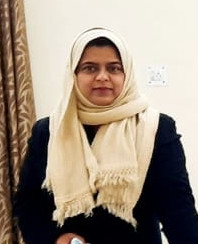

Dr Shaista Parveen
Associate Professor, Women’s College, AMU, Aligarh
This can be said with full confidence that all the religions and civilizations of the world have given man the idea of living a better life and promoting humanity. In human life,idleness grows only when society is free from oppression and injustice. Efforts to establish peace in human society are possible without revenge and hatred. Concept of nature and peace are frequently found in the sacred books and documents of Hinduism to create such a conducive environment. His teaching call brotherhood, unity and harmony the foundation of world peace. In the Vedas, peace is said to be necessary not only for human society but alsofor the entire universe.
The teachings of peace in rig Veda are as follows:
“Come on in, take a look and enjoy yourself! May our mind be one, mayour worship be one, may our goal be one, may our thought be one, may our desiresbe one, may our hearts be one, and may our unity be completed between us.” Rig veda:10:191:2
It is in Atherv Veda:
“Personalise and selfishness only bring sorrow and trouble if one person is for all of them and them are for him then only peace will come.” Atherv veda:23-24
It is in yajurveda:
“May there be peace in heaven, may there be peace in the atmosphere, may there be peace in all four world, may there be peace in water and let the herbs bring peace, may the trees and plants bring peace to all, may the wise men spread peace all over the world, may the four Vedas spread peace in the world, may there bepeace between us and may there always be peace.” Yajur veda:36-37
The shanti mantra is very important in Hinduism. Their purpose is to keep the surrounding calm. According to this theory, they are arranged at different times.
“May everybody be happy, may everybody be free from disease, may everybodyhave good luck, may none fall on evil days. Shanti shanti shanti “ brihadaranyaka upnishad1.4.14
Peace in Mahabharata has been named after various attributes:
“ non-violence is the highest religion. on-violence is the best penance. Non violence is the most beautiful gift.non violence is the name of tolerance.non violence issacrifice.non violence a force.non violence is the best friendship.non violence is the truth”.
It is in Manusmriti:
“ Peace and tranquillity, truthfulness, purity this is the religion of all four castes.” It is in Trikular (religion book in Tamil language)
“If a person hurts another in the morning, he hurts in the afternoon”.

Dr. Raza Abbas
Assistant Professor
Department of Shia Theology, Women’s College,
Aligarh Muslim University
One of the greatest questions of modern time which any sane and sensitive man cannot help asking is how a peaceful co-existence can be achieved in the present dangerous divided state of the world. Today the explosive forces of fundamentalism and narrow mindedness are on the rise in every society and religion. Warring nations, religions and civilizations have brought the world to the brink of collective annihilation. Gone are the days when religions and civilizations were centered in their own lands. Now the long distances between continents and countries, thanks to science and technology, have diminished and people of different societies are living closer to each other. The greatest problem of this diminished world is the peaceful co-existence among societies and religions.
Today, the world, more than anything else, is in the need for the development of a world community based on unity, harmony and mutual respect. If we are committed to make this world a place to live in, we must learn to be loyal to the whole human race. We must break down the barriers of egoism and hatred that separate mankind into warring groups and build bridges of understanding and mutual respect. We have to train our future generation in a fashion that they easily learn the values of universal brotherhood, harmony and respect.
Religious intolerance has been one of the most important factors for recent disturbances and restlessness in the world.
The Real Problem of the followers of different religions
Mankind, at every age of their history, have cherished the illusion of the finality of its existing modes of knowledge. This illusion, actually, gives rise to intolerance and fanaticism. The world has suffered a lot from the decease of dogmatism, of conformity. We in fact hold the view that our system of theology is an official, orthodox, obligatory and final presentation of truth. It is here that the real problem lies. Reality is larger than any system of theology, however large.
Today, we see the ignorant followers of different religions proclaiming themselves to be on the path of salvation and considering others to be misguided. These people are intoxicated by religious dogmatism. This religious dogmatism and authoritarianism increase manifolds when a religion comes under a state patronage. This preposition is true for almost all religions. Early Christianity and early Islam were not authoritarian. They were humanistic and tolerant so long as they were the religions of the poor and humble peasants, artisans and slaves, but when both of them become the religion of imperialism, their authoritarianism become more prominent. So long as their attitude persists, intolerance is inevitable. Faith, thus, becomes very dangerous if it is devoid of wisdom, tolerance and respect for others way of life. The crusaders who marched their armies towards Islamic state could not conceive it to be possible that the God of Islam might be the same God on whom they themselves are relying. One of the historians of crusades, Mr. Steven Runciman described the condition with some valuable words which are true to the contemporary world situation also. He writes: “In the long sequence of interaction and fusion between orient and occident out of which our civilization has grown, the crusades were a tragic and destructive episode. The historian, as he gazes back across the centuries, must find his admiration overcast by sorrow at the witness that it bears to the limitations of human nature. There was so much courage and so little honor, so much devotion and so little understanding. High ideals were besmirched by cruelty and greed, enterprise and endurance by a blind and narrow self-righteousness; and the Holy war itself was nothing more than a long act of intolerance in the name of God, which is the sin against the Holy Ghost.
The Solution:
The difference among the religions seem prominent because we do not seem to know the basic truth of our own religion. All religions require us to look upon life as an opportunity for self-realization. All religions affirm that man is confronted by something greater than himself which is Absolute reality. The Absolute reality is also the Absolute good for which man is athirst. God is the universal reality, wisdom and love and we are his children irrespective of race or religious beliefs. In every soul there lives a divine light which needs to be felt and realized. When one become aware of this light and awakes to the truth, he develops love for all creation and becomes free from hatred and greed. He will stand against terror or cruelty and will give voice to those who have no voice.
It is therefore not surprising that all the prophets and great teachers of the world have proclaimed that all men are brothers. All religions teach not hatred but love and consideration. A truly religious person has a sense of humanity. He has faith but not fanaticism. He submits to the reality felt by him and is aware that his particular way may be inadequate. It is, thus, not faith but fanaticism that asserts that ones own sect contain all the truth about God that has ever been made known to man in the past and no further truth can be made known in the future. Gandhi ji had once said: “I hold that it is the duty of every cultured man or women to read sympathetically the scriptures of the world. A friendly study of the world’s religion is a sacred duty”.
A true religious life must express itself in love and aim at the unity of mankind. Ritualistic concept of religion, as country to the real one, cannot purify the soul and integrate the human personality. The observance of certain rituals like moving rosaries, triple paint on forehead, pilgrims, baths in some holy waters cannot fulfill the aim of religion i.e. to overcome the conflict, integrate the personality and establishment of a society based on love, tolerance, understanding and justice.
If the present divided world is to be united on the religious basis it is on the basis of this or that religion but by a co-operation among the different religions of the world. If all religions mutually strive to achieve their common ideals and look at the difference in a sympathetic way, the world will surely be free from fear and terror and be a safer place for all. We must also remain watchful against the enemies of truth, men of fixed ideas and fanaticism. When such a society will be formed it will truly become global family with a due space even for non-religious and heretics also as God let his sun shine good and evil. A look of the different religious strengthens our view that religion is the hope of man and can sustain the new world.
Religious foundations for interfaith understanding:
Only a brief look of religions affirms the view that the spirit of love and sacrifice, sincerity, obedience and understanding is present in all religions. The idea of peaceful, active, mutually educative co-existence has been with us, in the form of religious teachings, for ages.
In Genesis (Bible)” The children of Earth are viewed as one family. They have one ancestor who is the father of all. Distinction of caste and class differentiation by blood or descent do not supersede the primary fact of human equality”. The Quran asks us” `not to revile those whom others worship besides Allah lest they, out of spite, revile Allah in their ignorance. The Quran says ‘We believe in God and the revelation given to us and to Abraham, Ismail, Isaac, Jacob and the Tribes, and that to ‘Moses and Jesus and that given to other Apostles from their Lord. We make no difference between one and another of them, for we bow to Allah’ Muhammad through of himself as one who purified the ancient faith and rid it of the extravagances that had crept into it. The Quran says: `The same religion has He established for you as that which He enjoined on Noah, which we have sent by inspiration to thee. And that which we enjoined on Abraham, Moses and Jesus, namely, that you should remain steadfast in religion and make no divisions therein”
The great commandment of the Jews is to` love thy neighbor as thyself’. In Leviticus XIX, where we find a commentary on this principle, it is said:
“Let there be no hate in your heart for your brother; but you may make a protest to your neighbor so that he may be stopped from doing evil. Do not make attempts to get equal with one who has done you wrong, or keep hard feelings against the children of your people, but have love for your neighbor as for yourself”.
John says:”If a man says I love God, and hates his brother, he is a liar”. In Rock Edict xii, Asoka a buddhist emperor proclaims that the faiths of others all deserved to be honored. By honoring them one exalts one’s own faith and at the same time performs a service to the faiths of others.
Is co-existence Practicable?
This is another very important Question. Whether this kind of co-existence is practically possible among the warring societies and religions or not? The answer is in affirmative. Yes it is practically possible and we have seen the examples in the past. The sole condition to achieve this goal is a proper mindset. We should first of all abandon our fundamental attitude that only we are the possessors of light and others are groveling in darkness. If we are ready to move forward with this frame of mind the goal is not too big. The key word in this journey towards the goal is tolerance, tolerance of other people’s views; religious tolerance and ideological tolerance.
We should take a look of the past and seek inspirations. Centuries of conflicts between the Catholics and Protestants led to the conclusion that they can never live peacefully but we find now that they can not only live together but assist and educate each other. In the time of crusades it was asked either the cross or the crescent. But later we discovered that Cross and the Crescent could live together, educating each other. The modern European Renaissance is the product of the enlightenment brought to Europe by the Arab translators of the great Greek works, and Muslim Theologians and thinkers like Averroes and Avicenna. So we have to come out of the philosophy of this or that because indicates that God has left some people orphaned without any guidance while Quran says’ Unto every people we sent a messenger to teach them to worship God’.can conclude our discussion with the remark that the world as a whole demand the philosophy of co-existence, not merely passive, neutral co-existence, but active, mutual, educative co-existence.

Dr. Faiyaz Haider
Assistant Professor
Department of Shia Theology,
Aligarh Muslim University
The original definition of tolerance and the way in which the word is used now are quite different. Originally, tolerance meant to acknowledge that others have differing beliefs and accept that it is their right to do so. In this way, Christians are to absolutely be tolerant. Recently, tolerance has come to mean accepting that those other beliefs are true—something Christians absolutely cannot do.The Bible is specific that we should expect others to have different beliefs about God. Galatians 4:8 says that those who don't know the true God are slaves to what are not gods. Romans 1:18-25 explains that although God has given evidence of His nature in creation, many will refuse to believe what their eyes tell them. And Luke 10:21-22 says that on occasion, it is to God's purpose that people do not see Him; God often closes the eyes of those who in pride rely on their wits to find Him instead of in humility seek Him with their hearts.
Christians are to tolerate others when they have different beliefs about God. But are we to expect tolerance in return? Luke 6:22 says we are blessed when others reject us because we follow Christ. John 15:18 says that when the world hates us, we need to remember they do so because they hated Christ first. It is foolish to expect tolerance from others toward our Christian beliefs, even if they demand tolerance for their own. God has told us clearly: we will not get it.
But God has also told Christians what our response should be when we are faced with intolerance. Matthew 5:43-48 says we are to love our enemies and pray for them. Romans 12:20 says we are to provide for them. We do not play by the world's rules. We do not respond to intolerance with fear and hate. Instead, we express the love of Christ in us.
Unfortunately, the world no longer defines "tolerance" as an acknowledgment that others have a differing belief. It has come to mean full acceptance of those beliefs. Of course, this definition makes no logical sense because embracing this type of tolerance precludes any personal opinion or belief. Christians are not to endorse religious beliefs that run counter to what the Bible teaches.
The problem with tolerance as it is now meant is that it rejects the possibility that objective truth exists. The Bible teaches that truth does exist, that God is truth, and that we are to follow in His truth. John 1:14 and 17 says that Jesus, who came from the Father, gives us truth. John 8:32 and Romans 6:16-23 says that the truth sets us free from the control of sin.
The Bible is also clear regarding those who hide or distort the truth in the name of tolerance. Romans 1:18 says whoever suppresses the truth will receive the wrath of God. In Matthew 28:19-20, Jesus says that our mission is to teach others of the truth about Him. First Corinthians 13:6 (NIV) says, "Love does not delight in evil but rejoices with the truth." John 14:6 says that Jesus is the truth. While Christians can acknowledge the right of others to have different beliefs, we cannot allow those beliefs to go unchallenged for one simple reason: it is not loving, and Jesus calls us to love (Luke 10:25-37).
It's inevitable that the world will call believers intolerant, but we can mitigate the damage by being intolerant in the way God tells us to. First, we must know what we believe (1 Peter 3:15). Second, we need to know how to teach what we believe. Second Timothy 2:23-26 says:
Have nothing to do with foolish, ignorant controversies; you know that they breed quarrels. And the Lord's servant must not be quarrelsome but kind to everyone, able to teach, patiently enduring evil, correcting his opponents with gentleness. God may perhaps grant them repentance leading to a knowledge of the truth, and they may come to their senses and escape from the snare of the devil, after being captured by him to do his will.
In the heat of the moment, faced with personal attack and rejection, it's easy to forget the reason we speak truth. It is not so that we'll be proved right and vindicated, but in the hope that the truth will set another free.
Should a Christian be tolerant of others' religious beliefs? Yes, in the classical sense. The Bible teaches that many will reject God. We should be prepared to accept that, as well as the fact that those who reject God will reject His followers. Christians should not be tolerant in the modern sense. We should not endorse the belief that all religions lead to God, that truth is a personal construct, or that everyone's beliefs are valid. Jesus is the truth. Christians are called to tolerate – and even to love – people without accepting their false beliefs.

Suraqua Fahad
Research Scholar, Delhi School of Social Work
University of Delhi
In the contemporary techno-materialistic world, briefly, it is very imperative to comprehend that to understand any religion, there is a sure need to explore the manuscripts and holy books based on authentic sources associated with that religion rather than to understand a religion through their manipulated followers.
Likewise, Islam itself a religion promotes Justice and Harmony expands internally and externally. The Islamic system is based on justice. If there are tears for the oppressed, then there are swords for the oppressors.
In Qur’an, Allah(Subhanahuwata'ala)said:
“O mankind, indeed We have created you from male and female and made you peoples and tribes that you may know one another. Indeed, the noblest of you in the sight of Allah(Subhanahuwata'ala)is the most righteous of you. Indeed, Allah(Subhanahuwata'ala)is Knowing and Aware.” (Qur’an 49:13)
The above verse depicts the first principle of Social Justice i.e. Access and Equity. Allah (Subhanahuwata'ala)declared that there is no concept of discrimination or “Second Class Citizen”exists in terms of any social perspective in Islam.
In terms of understanding that despite clear declaration given by Allah; why is Islam projected as the religion of fear, hostility, prejudice, and discrimination by Indian Media? Why Indian Media fuels Islamophobia?
Ontology and Epistemology of Media towards Islam
From the ontological perspective, ‘Islamophobia’ is a concept which is deep rooted in the complex socio- political realities and this term is often applied in the pursuit of political interests.
There is a need to understand the ‘Islamophobia’ from the political lens and monopolized dimensions of Indian media just for the sake of interest of rising in TRP. It’s important to distinguish between honest and legitimate criticism of Islam as a religion or set of ideas and Islamophobia. For Example; as news website News laundry’s AtulChaurasia noted on his show: “The Mumbai incident once again brought to the fore the diseased, sectarian face of channels because in the background they had spotted a mosque.”(Al-Jazeera, 15th May 2020)
During this pandemic, by late March 2020, Muslims became the focus of media attention after it emerged that six people who died from COVID-19 in southern Telangana state had attended an event held by a Muslim religious group called TablighiJamaat from March 13-15, 2020, in New Delhi.
Muslims faced further disparagement in the first week of April, 2020 after a government spokesperson openly connected a spike in coronavirus cases to the Jamaat event, which was also joined by preachers from other Muslim countries. Later on, it was publicly trended on some social media like Twitter hashtags, such as #CoronaJihad.
In the past few years, a sequence of false reports on social media and news media about Muslims spitting, roaming naked, or defecating in public have been debunked. While studying debunked COVID-19 stories in India, University of Michigan associate professor Joyojeet Pal and his co-researchers found a rise in misinformation about Muslims from about the end of March.In the mainstream media, “the truly insidious part is the way in which Islamophobia is suggested, without explicit mention,” Pal said.”(Al-Jazeera, 15th May, 2020)
The matter of fact is that, in the contemporary scenario, Indian Media, despite playing the role of the fourth pillar of a democratic country, is busy in trying to manipulate the citizens of India against Islam through spreading false news and propagandas just for the sake of self-monopolized interest.If we are careful, nuanced, and clear about what we mean by Islamophobia, then it can be meaningfully and properly applied.
In contemporary scenario, Media trying to portray that Muslims are deliberately trying to demolish the essence of Hindu religion and they are the enemies of other religions. But the fact is that, to disrespect another religion is explicitly condemned in the Quran. In Qur’an, Allah(Subhanahuwata'ala)ordered:
“Do not abuse those whom they worship besides Allah.” (Al-Qur’an, 6:109)
If a person prerogatives to be Muslim, he is not permissible to abuse or contempt another religion. This is prohibited according to the Quran.
Need for Change
The truth has three types: mine, yours, and the actual truth. Unfortunately, the contemporary Indian media is mixing out content exactly based on this principle—my truth vs. your truth. Both can altogether be light years apart from the actual truth. The guiding light of the media today is “ideology.” And ideology has not only tumbledown science and truth from time immemorial, but, as can be clearly seen in contemporary India, it is eroding democracy and the syncretism that India has enjoyed for decades. Propaganda and rhetoric have driven some of the most brutal fascist regimes in the world. Demonization and alienation of communities are the cornerstones of such regimes. The Indian media must introspect and steer clear of being complicit in turning a significant population of India into Islamophobes. And Islamophobia isn’t just an irrational hostility, fear, or hatred of Islam or Muslims. It will bear heavy social costs, which will eventually erode civil and human rights in India.